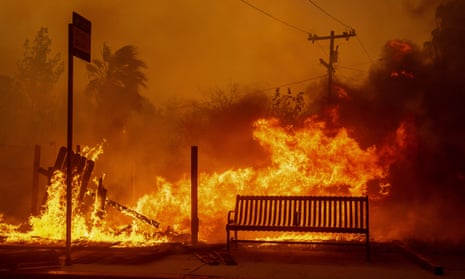Amid the ashes of his home, Bill Threadgill, a 15-year resident of Altadena, California, struggles to make sense of the destruction left by the recent wildfire. Standing in the remnants of his house, which was reduced to rubble, Threadgill searches through the debris, salvaging copper pipes with plans to sell them. Only the chimney and two porch pillars remain standing, a haunting reminder of what once was.
“I’ve been stretched financially,” says Threadgill, a handyman and caregiver, his voice muffled by an N95 face mask. The financial strain that had already weighed heavily on his family has only deepened as their home, like many others, was consumed by the devastating flames.
On January 7, the Eaton Fire ignited in the nearby mountains, quickly escalating into a catastrophic blaze. Fueled by hurricane-force winds, the fire prompted mass evacuations and ravaged homes across the region. The inferno, which was part of a larger series of wildfires that struck the Los Angeles area, has destroyed or damaged more than 5,700 structures and claimed at least 16 lives. In total, nearly 12,000 buildings have been lost, and at least 25 people have died.
These wildfires, which have been exacerbated by climate change, could result in one of the most costly natural disasters in U.S. history. Experts estimate damages could exceed $250 billion, a staggering toll that highlights the growing intensity of wildfires in the region.
For the residents of Altadena, including Threadgill, the community’s resilience and unity are vital in the aftermath of such loss. As people work together to rebuild their homes and lives, the path forward remains uncertain, but their determination to recover and support one another is clear.
The Eaton Fire, which is just one of the many wildfires that have swept through California in recent years, continues to underscore the need for better fire prevention and climate action as the state braces for an uncertain future.
- Banks Face Pressure to Boost Renewable Energy Financing
- Islamic Resistance of Iraq Claims Responsibility for Drone Attack on Southern Israel
- Massive Explosion at Iranian Port Tied to Missile Fuel Shipment Kills 5, Injures Over 700
- UN Court Says Israel’s Occupation Of Palestinian Territories Is Illegal


